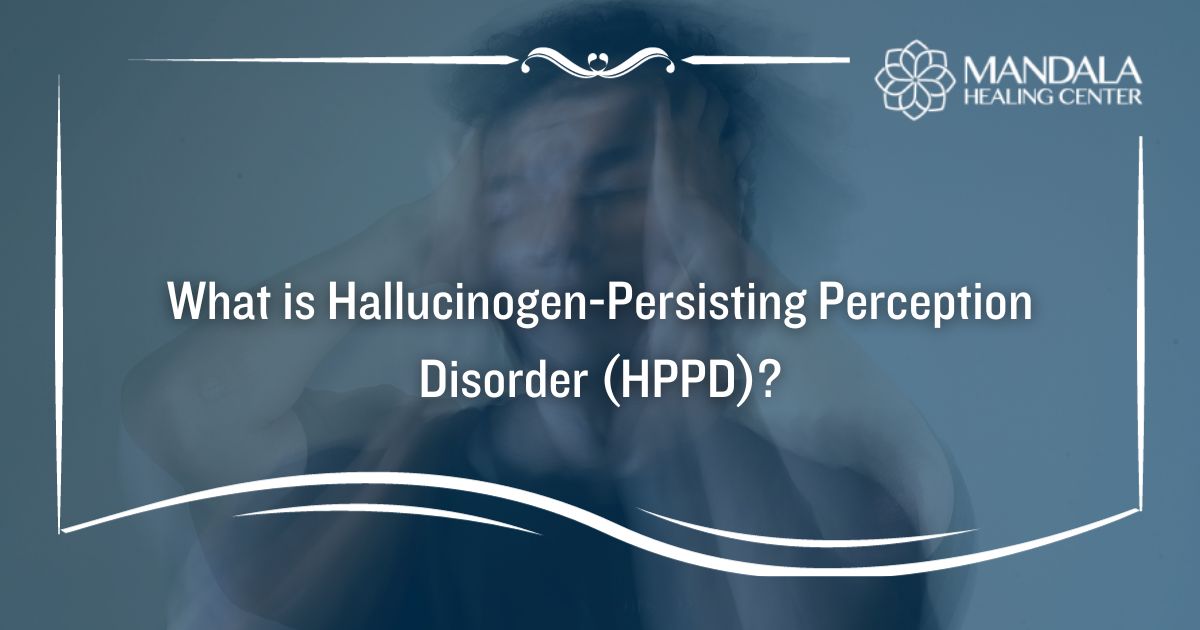Hallucinogens are a class of substances that can cause visual, auditory, and cognitive effects some people find pleasurable. People who use hallucinogenic drugs may develop hallucinogen-persisting perception disorder (HPPD), resulting in lingering effects that last for days, weeks, or even years after their last use. These effects can be disturbing and disruptive to people’s everyday lives and may affect their functioning.
This article will explore the effects of HPPD, how to recognize it, and what can cause it. Reach out to the Mandala Healing Center for more information about hallucinogen-persisting perception disorder or to learn more about our holistic substance abuse treatment programs.
What are Hallucinogens?
Hallucinogens are a kind of drug that alters a person’s awareness and perception of their surroundings. Hallucinogens are also called “psychedelics.” Some hallucinogens are derived from organic sources like fungi and plants, and others are synthetic (artificial).
Common hallucinogens include:
- LSD (acid)
- Peyote
- Psilocybin (magic mushrooms)
- PCP
- Ketamine
- Salvia
- DMT
Hallucinogens can temporarily change the way a person feels and thinks. People who use hallucinogens may experience hallucinations, meaning that they see, hear, or feel things that are not actually there. Hallucinations can be very vivid and realistic and can range in intensity. Some hallucinations are pleasant, while others can be terrifying or disturbing.
Hallucinogen users may experience altered sensations or thoughts while under the influence of the drugs. They may feel out of control or disconnected from their environment or may feel a sense of altered time.
When someone is under the influence of a hallucinogenic drug, it’s known as “tripping.” People can have “good trips,” where they feel happy, content, and at peace, or “bad trips,” where they feel out of control, agitated, or experience frightening and disturbing hallucinations.
As more states consider legalizing hallucinogens for recreational or medical use, it’s more important than ever to understand the short and long-term risks of using these potent substances.
What is Hallucinogen-Persisting Perception Disorder (HPPD)?
When people use hallucinogens, they “trip,” meaning that they experience drug-induced effects that include altered perceptions and mood. The results of hallucinogens can vary widely, and a person’s experiences can vary depending on the type of hallucinogen they used, how much they took, and other substances and medications they were using at the time.
While people may enjoy a “good trip” and feel it enhances their well-being, some have overwhelming or negative experiences. People may also experience flashbacks of a trip long after using hallucinogens. Flashbacks involve reliving or re-experiencing the effects of a trip, including:
- Seeing halos around objects in the environment
- Seeing things differently than they are–size, shape, or color distortion
- Experiencing bright lights that never fade
People may find flashbacks to be disruptive, annoying, or even debilitating. While people are typically aware of their surroundings during a flashback, they may feel distracted, unsettled, or upset at these visual distortions.
When someone experiences frequent flashbacks from hallucinogenic trips, it may be diagnosed as hallucinogen-persisting perception disorder (HPPD). HPPD is a rare condition that can be difficult to diagnose.
There are two types of HPPD: Type 1 and Type 2. Type 1 HPPD includes experiencing short, sporadic flashbacks. Type 2 HPPD involves long-term, pervasive, and disturbing flashbacks.
Research on hallucinogen-persisting perception disorder is limited, and medical professionals may not always recognize it. However, addiction specialists can often recognize symptoms and may be able to offer practical ways to manage the condition.
Recognizing the Symptoms of Hallucinogen-Persisting Perception Disorder (HPPD)
Knowing the symptoms of HPPD can help you identify this rare disorder and seek support to manage the symptoms.
Here are some of the symptoms of hallucinogen-persisting perception disorder.
Altered perception of color
People with HPPD may see objects as more colorful, bright, or vivid than they are. They may also experience pops of vivid color in their field of vision without a reason or source. Similarly, people with HPPD may struggle to identify or tell the difference between colors.
Altered perception of size
People with HPPD may see objects in the environment as much larger or smaller than they really are. This is especially true for things in a person’s peripheral vision.
Halos and trailers
People with hallucinogen-persisting perception disorder often see bright rings of light around objects. They may also see the outline of an object after it has moved or see a trail behind it.
Geometric patterns
People with HPPD may see geometric, repeating patterns in places where these patterns do not actually exist. For example, a field of flowers or faces in a crowd may appear as a checkerboard pattern. Similarly, people may see images within images, such as seeing spots on a blank piece of paper.
Trouble with reading
People with HPPD may struggle with visual perception issues while reading. Words may move around the page, shake, or appear mixed up or unreadable.
Sense of unease
People with HPPD may be overwhelmed by the feeling that something is not right during a flashback. This can affect how people feel and behave, leading to discomfort, embarrassment, and social problems.
People who research HPPD have found that people with depression, suicidal thoughts, anxiety, and panic disorders are more likely to develop the condition than others who do not have these conditions. However, there is no way to perfectly predict who will develop HPPD and who will not.
Learn More About Hallucinogen-Persisting Perception Disorder (HPPD)
Reach out to the team at the Mandala Healing Center to learn more about HPPD and how to manage its symptoms. Our treatment programs can help you feel more in control over your symptoms and provide valuable therapies and treatments to address the underlying roots of substance abuse.
Contact our specialists now to learn more about finding treatment or for support at any stage of your recovery journey.












